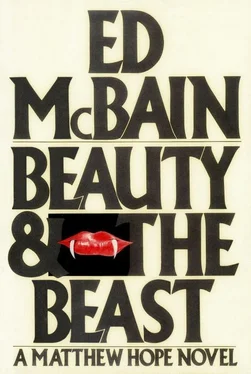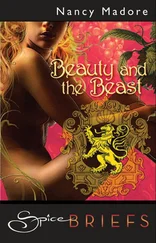And then a woman: “Hope is the thing with feathers.”
Click.
Another woman: “If God intended niggers to be masters, then Harper’d be defendin you ’stead of the other way around. He’s already raised his hand against one white person, an’ I hope he comes to see you an’ uses the same hammer on you that he used on that nigger trash he killed next. Good riddance to her and you, too, Mr. Hope. Say hello to the devil for me.”
A man: “Well, Mr. Hope, you got yourself a real good one this time, dinn you? You do your best on this one, Mr. Hope, and every nigger in town’ll be runnin over to your office so’s you can get him offa whatever he done — be it murder, be it armed robbery, be it rapin white women. Congratulations, Mr. Hope, you’re a real credit to the community.”
And a woman: “I told my husband you’re the scum of the earth. He said you should be shot in public.”
Another woman: “Why don’t you move to Africa, Mr. Hope? Plenty of people there who’d love you to death, maybe even make you chief of they tribe, so’s you can get to wear beads and paint and all. Think it over.”
A man: “I’m calling on behalf of the CCAC, Mr. Hope. I don’t know if you’re familiar with our organization, the letters stand for Concerned Citizens Against Crime. We’ve been working hard to see that people like your client Mr. Harper are punished adequately for the crimes they commit against our community. I want you to know, Mr. Hope, that we’re adding your name to the list of people we feel are working against that goal. I doubt you’ll see too many honest and law-abiding clients in your office after that little speech you made tonight. I hope you know how to shine shoes, Mr. Hope. Or maybe cleaning toilets is more in your style.”
And lastly: “Mr. Hope, this is Lucille again. You might like to know I’m five feet eight inches tall, and I weigh a very curvy hundred and fifteen pounds. A lot of people think I look like Jacqueline Bisset, if you’re familiar with her. You may have seen her wearing that wet T-shirt in The Deep , the movie The Deep . My husband calls me ‘Bullets,’ if you take my meaning. Call me or come see me, hear?”
After Lucille’s voice, there was only a long hum on the tape. I switched off the machine, and went back into the living room, stunned. I had not until that moment fully believed the accounts I’d read of crank calls and letters from the public in cases involving any major crime. And whereas I knew that black-white relations were as strained in Calusa as they were anyplace else in the nation, I had until now entertained the perhaps naïve hope that things could only get better; now I knew exactly how deep the hatred ran. I sat sipping at my martini and wondering if I should call Bloom. A man had threatened to park outside my house with a sawed-off shotgun, hadn’t he? Should I ask for police protection? Should I have my telephone number—
The phone rang.
I suddenly regretted having turned off the answering machine. I did not want to talk personally with anyone spouting abuse or making threats. The phone kept ringing. I put down the martini glass, and went to answer it.
“Hello?” I said.
“Mr. Hope?”
“Yes?”
“This is Kitty Reynolds.”
“Yes, Miss Reynolds?”
“I’m sorry to be bothering you so late at night, but I wonder if... Mr. Hope, do you think you could come here for a few minutes? There’s... something I’d like to discuss with you.”
“What is it, Miss Reynolds?”
“Well, not on the phone. I’m on Flamingo Key, the address is 204 Crane Way, just past the yacht club and over the bridge. I know it’s late, but if you could come here, I’d appreciate it.”
I looked at my watch. It was ten minutes to eleven.
“Give me twenty minutes,” I said.
I did not get to Flamingo Key until almost midnight because a northbound trailer truck had jackknifed across US 41 and the resultant traffic tie-up was a Fellini version of Hell. I-75, the new Calusa bypass, was scheduled to open in May (promises, promises!), a four-lane highway that would connect Travers to the north with Venice to the south and eliminate (we hoped) much of the tourist traffic that clogged Sarasota’s and Calusa’s main artery. In the meantime, I sat for forty minutes behind a long line of irritable motorists, listening to what Frank called Calusa’s “Old-Fart Network,” a radio station that played schlock arrangements of all the Golden Oldies of the forties, introduced by a dove-throated announcer who dropped lyric bits of poetry such as, ‘We walked the beach alone that day, you and I, picking up sand dollars like street urchins beseeching travelers. We’ve journeyed long and far since then, my love, but the treasure is still ours alone, to share.” I found the man amusing; Frank kept saying he was no William B. Williams, who I gathered was a New York City disc jockey.
Frank calls Flamingo Key “Fandango Key,” this because of the largely Spanish style of architecture favored by the residents there. If there is a Gold Coast in Calusa (and there truly isn’t), then Flamingo Key qualifies, I guess; the homes there are all in the $500,000-and-over class, and the canals are lined with sailboats and motor cruisers that in some instances are even more expensive than the houses. Each of the houses on Flamingo is on what is known as “waterfront acreage,” be it Calusa Bay itself or one of the many waterways winding through the immaculately landscaped development. Frank says that the lawns on Flamingo always look as if they’d recently been clipped by a US Marine Corps barber on Parris Island. Frank does have his prejudices.
The security guard at the main gate stepped out of the booth as I braked the Karmann Ghia to a stop. It was a few minutes to midnight, a bit late in the day for callers. I told him Miss Reynolds was expecting me, and he said, “Just a moment, please, sir,” and stepped back into the booth, where he consulted a sheet of paper attached to a clipboard. He picked up the receiver of a hanging wall phone, dialed a number, and while he waited for it to ring, said, “Your name, please?”
“Matthew Hope,” I said.
He turned back to the phone. “Miss Reynolds,” he said, “a Mr. Hope to see you.” He listened, said, “Thank you,” and then hung up. “First street on your right,” he said, “it’s 204 Crane Way, the second house in.”
I put the Ghia in gear, drove to the corner, made the first right, and found the mailbox for 204 in front of a Spanish hacienda next door to another Spanish hacienda with the number 206 on its mailbox. I pulled into the driveway, turned off the ignition, and walked up the path to the front door. There were lights burning all over the house. Kitty Reynolds opened the door the moment after I took my finger off the bell button.
“I was afraid you weren’t coming,” she said. “Come in, please.”
She was wearing another of the creations she undoubtedly sold at Kitty Corner, a blue nylon peignoir slit high on the left leg and slashed low over her breasts. Her long blonde hair was hanging loose to the shoulders. She wore no makeup. Her eyes, an echo of the pale-blue peignoir, shifted suddenly from my face, glanced out beyond my shoulder, swept the lawn outside. I almost turned to look.
“Come in,” she said again, and stepped aside to let me pass, and then closed and locked the door behind her.
“I’m sorry I’m late,” I said. “There was an accident on Forty-One.”
“I’m usually up till all hours, anyway,” she said. “Would you care for something to drink? I was just about to pour myself a cognac.”
“Cognac would be fine,” I said.
She led me into a living room furnished almost entirely in blue — pale-blue carpeting, darker blue upholstery, diaphanous blue drapes, a Syd Solomon painting in various shades of blue on the white stucco wall over the fireplace. Blue was the lady’s color, no question about it. She’d been wearing blue when I’d called on her in her shop, and she was wearing blue now in a room predominantly blue. Even her high-heeled satin mules were blue. I watched as she poured cognac into a pair of snifters. She carried both glasses back to where I was sitting on one of the modular sofas arranged before the fireplace hearth.
Читать дальше












